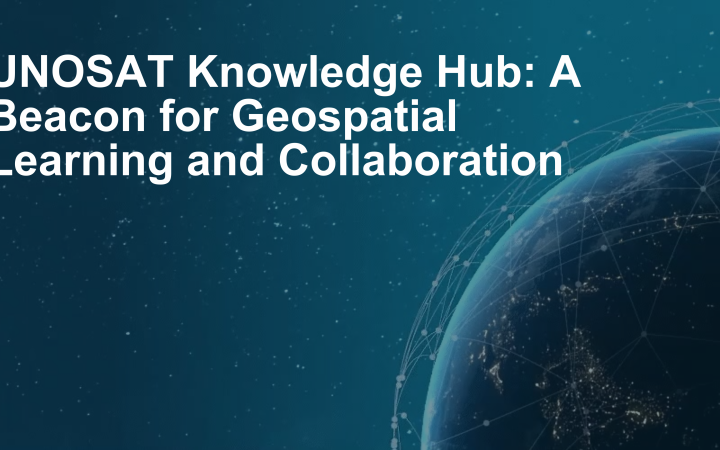5 March 2024, Geneva, Switzerland - The United Nations Satellite Centre (UNOSAT) inaugurates the UNOSAT Knowledge Hub—an innovative platform facilitating connections among stakeholders, including past associates, participants, and UNOSAT trainers. This hub is meticulously crafted to invigorate and enhance expertise in Geospatial Information Technology through a diverse range of learning resources and courses.
The knowledge hub is part of the project Strengthening Capacities in the Use of Geospatial Information for Improved Resilience in Asia-Pacific and Africa, with funding from the Norwegian Agency for Development Cooperation (NORAD). This project seeks to strengthen national climate risk response by developing the GIT capacity of recipient organizations in eight African, Asian, and Pacific nations.
As an inclusive resource centre, the Knowledge Hub serves as a nexus for stakeholders across various sectors. It offers a specialized platform fostering insights and skill development in the dynamic field of Geospatial Information Technology.
With over two decades of practical experience, the United Nations Satellite Centre (UNOSAT) excels in designing, developing, and delivering bespoke geospatial services and learning solutions. These services cater to UN agencies, funds, and programmes and extend to Member States, international organizations, and academia. UNOSAT's commitment to leveraging cutting-edge science and technology ensures that beneficiaries possess the tools and solutions necessary for informed policies, strategic planning, and effective decision-making.
Connecting Stakeholders for Collective Progress
The UNOSAT Knowledge Hub is more than only a repository of information; it is a thriving ecosystem where former colleagues, participants, and UNOSAT trainers converge to expand and refresh their knowledge in Geospatial Information Technology. Stakeholders enjoy various benefits, including access to the alumni directory, the opportunity to remain connected with peers and trainers, participation in awareness-raising webinars and conferences, and access to UNOSAT publications, software, and algorithms.
Access to this platform is restricted to beneficiaries, and registration operates on an 'invitation only' basis, ensuring a secure and dedicated space for those involved in the dynamic world of geospatial technology.
A highlight in the Knowledge Hub's calendar was the webinar on Landslide Mapping which took place on January 31, 2024, at 10:00 AM CET. This event explored triggering factors, global impact, and UNOSAT's pivotal role in this crucial area. The session featured case studies and discussions on the power of Geographic Information Systems (GIS) in decision-making, providing participants with valuable insights. An interactive Q&A segment ensured direct engagement and exchange of ideas.
For those who missed the first edition of the Knowledge Hub's webinar series, which delved into the technical backstopping role of satellite imagery analysis in Vanuatu, is still available on replay. On March 8, at 9:00 Geneva Time, a special webinar celebrating International Women’s Day will focus on gender equality and empowerment in the field of Geospatial Information Technology (GIT). Open to all, it is an invaluable opportunity to learn more about UNOSAT’s work and hear from inspiring women leaders who are making significant contributions to advancing gender equality and empowerment in the realm of Geospatial Information Technology.
Building a Resilient Future Together
The UNOSAT Knowledge Hub extends its gratitude to the community for its active participation. As we anticipate our stakeholders’ engagement in the upcoming Landslide Mapping webinar and future events, we celebrate the growth of a collaborative knowledge hub. Together, we are building a resilient future, equipped with the knowledge and tools necessary to address the challenges that lie ahead.


